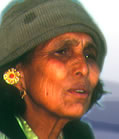THEMES IN THIS
TESTIMONY
Development

Education

Employment and Income

Environment

Family Life

Gender

Identity

Politics

Click on arrows
to find more
testimonies
featuring
these themes
|
|
Sex
|
female
|
|
|
Age
|
25
|
|
|
Identity
|
Hindu, Brahmin
|
|
|
Occupation
|
teacher
|
|
|
Location
|
Sindhukot, Sindhupalchok
|
|
|
Date
|
February 1994
|
|
summary
An extremely good, solid interview mainly consisting of this 25-year-old school teacher's impassioned plea for education for girls. She first learnt about the importance of women’s issues from her mother, and has been running Women Service Classes since 1983. She believes the main problem for women is their lack of education: “The convention is to send the sons to school while the daughters are made to attend to domestic chores... If they are sent to school, barely they reach the age of 15 and then they are considered ripe for marriage.” Little importance is attached to female education because they are seen as born to go to another family – they are “sent away like buffaloes”. She blames society and age-old conventions, rather than parents, for holding girls back: “society simply doesn't know if there's any benefit”. Female education has increased in the past decade and women have learnt that women in other parts of the country are studying, so they must, too.
There is a good section on out-migration to Bombay for prostitution, which since 1950 has been common amongst girls from lower castes living in the “upper areas”. She comments on the reasons for departure: girls see the wealth of returnees and go of their own accord; are sent by their parents; or are tricked into going. The trend is most common among the Tamang caste, also Biskwakarma, but rare among Bahun and Chettris. Returnees are effective in cautioning others about the dangers of HIV/AIDS (10-11 returnees in the region now have HIV/AIDS) and Bombay is starting to losing its appeal. In the future the narrator would like to “work in an institution where I could investigate problems that women are facing and work for their welfare and promote their awareness.”
detailed breakdown
|
You will need a password from Panos to view the full
transcript of the interview. To apply for a password, click here.
Once you have a password, click here to go to the beginning
of the transcript. You can also click on any section of the
breakdown of content below and go straight to the
corresponding part of the transcript.
|
| Section 1-3 |
She lives with and supports her mother and infant daughter (not clear where husband is). Encouraged to study by father, who had seen educated girls in Kathmandu. Generally people don’t invest in female education because girls are "considered strangers” in their own homes before marriage. 30% of women have been to school, but only a few who start school sit the leaving exams.
|
| Section 4-5 |
Very few women employed, and by some they are considered immoral. People must be made to see benefits of educating girls. "Wise ones” could promote schooling for girls, showing villagers "easy lives” of girls who have been educated and "toils” of those who haven't. Describes girls' domestic tasks: women work 18 hours each day, six hours longer than men.
|
| Section 6-7 |
Hard to change these conventions, but wise women, and men, "must show society what is right”. Describes literacy classes run by AAN that helps women see value of education for daughters. Classes also teach hygiene and the importance of saving. Describes activities of eight local saving-groups, in which women save money and grain. These schemes have boosted women's status in men's eyes and their own self-esteem.
|
| Section 8-9 |
Describes movement of women to Bombay to become prostitutes and their return. On their return some spend their earnings wisely, others fritter it away. They are treated well within family and their own caste, but “Among other communities, the Bahuns and Chettris, they are looked down upon. Most of the women...do not get married here.”
|
| Section 10-11 |
Women earn half as much as men because they are seen as weaker. Men make the financial decisions. They feel it’s their right, because they stay with their families all their lives – this attitude prevails in all communities.
Women are under-represented in various institutions because of a lack of awareness and education, and societal prejudice.
Dowry: if it's deemed too small, adjusting to married life "becomes a difficult affair".
She feels a village committee is needed to educate people about over spending and she advises girls not to marry boys who demand dowry.
|
| Section 12 |
Women not much involved in afforestation work. When one person assigned from each household, women don't get chance to participate.
Health and treatment: men generally receive treatment quicker than women, “However, educated families treat them with equal care.”
|
| Section 13 |
25% of men, literate themselves, think women should be educated. Others think their only job is to do domestic chores. Most women vote under influence of male relatives and are not allowed to attend meetings. Equality is enshrined in constitution, but not found in practise. Blames government's lack of political will.
|
| Section 14-16 |
Importance of literacy training in which active participation encouraged (“one-sided effort is no good"). Women must have equal property rights and financial decision-making power. Things are changing under multiparty democracy: more women in school, more political participation. Poor women work harder than rich, but workload divided more equally and women have greater say in poor families.
|
| Section 16-18 |
Women need education and positive examples. They have difficulty getting loans: “women are considered less eligible for loans than men. It is the men that hold the purse strings so it is considered dubious if women will pay back the loans.”
Talks about her future: “It looks like my life will be devoted to teaching. Actually my aim is to work in an institution where I can investigate and identify the problems that women are facing and work out solutions to them.” Her husband, also a teacher, “shares feelings for the welfare and rights of women with me.”
Need to raise awareness among women about environmental issues. |
|


